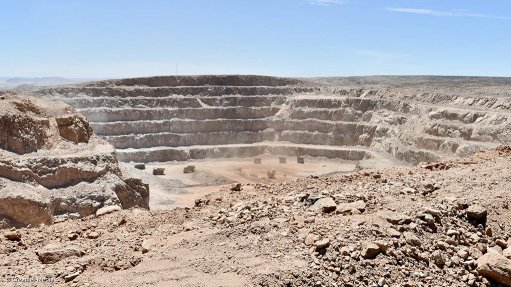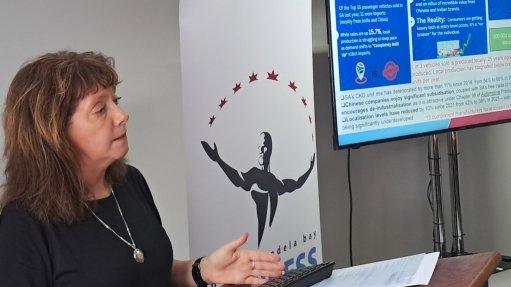Off-grid toilet-tech project in Cape Town adds new pilot sites
Off-grid sanitation technology is now operational at two pilot sites in Strandfontein and Macassar, with three new sites to be added by the end of June, says the City of Cape Town (CoCT).
The city initiative is supported by the Water Research Commission and funded by the Gates Foundation.
Since its launch in December last year, the project has seen 17 full-flush toilets installed at the Masincedane (Strandfontein) and Nyakathisa (Macassar) informal settlements.
Each ablution block consists of three refurbished shipping container modules connected to an on-site treatment plant, which means they operate independently from the bulk sewer system.
Full-flush toilets were previously only possible with connection to sewer pipes, but the new off-the-grid system treats wastewater on site through a membrane biological reactor and ozone disinfection.
The treated water is then recycled for flushing, making it ideal for areas where there are challenges in connecting sanitation facilities to bulk infrastructure.
CoCT says the innovation complements the other solutions the city currently supplies, including chemical, container, and portable flush toilets, also in areas where connections to bulk infrastructure are not immediately possible or feasible.
“Already we are seeing improved sanitation for [these communities] as a result of the pilot study, which was previously not feasible without a direct connection to sewer pipelines,” says Cape Town mayor Geordin Hill-Lewis.
In order to determine the viability of the technology for further roll-out, the city has established a monitoring and evaluation working group, with city officials monitoring four performance areas to evaluate the outcome of the pilot studies.
These include technical performance (quality of treated effluent, system functionality and robustness of the technology); environmental performance, including regulatory compliance; economic performance and financial viability; and social acceptance (user experience, community feedback, health conditions and safety).
Prior to the December 2024 handover, extensive community engagement and training workshops were conducted on the use and maintenance of the facilities.
“The Masincedane community has been exemplary in taking full ownership and making use of the facilities with the utmost care,” says CoCT Water and Sanitation MMC Zahid Badroodien.
Planning for the next three pilot sites at 7de Laan, also in Strandfontein, OR Tambo, in Khayelitsha and Rasta Camp, in Ocean View, is in advanced stages, with construction due to start this month.
These facilities are expected to be commissioned before the end of June.
The two different technologies that will be tested at these sites operate on the same principle of providing off-grid non-sewered sanitation systems.
“This is a significant stride in the city’s efforts to improve sanitation services in areas where the challenges presented by informality require new solutions,” explains Badroodien.
“The ultimate goal is to test the viability of rolling out similar technology where it is most needed, across Cape Town.
“Education is key to sustainability,” adds Badroodien.
“The community is reminded that the system can only run efficiently when used only for flushing the three Ps – pee, poo and toilet paper.
“If any other items are flushed down, the system will not be able to function properly, which will lead to costly blockages and damage to the infrastructure.”
Article Enquiry
Email Article
Save Article
Feedback
To advertise email advertising@creamermedia.co.za or click here
Press Office
Announcements
What's On
Subscribe to improve your user experience...
Option 1 (equivalent of R125 a month):
Receive a weekly copy of Creamer Media's Engineering News & Mining Weekly magazine
(print copy for those in South Africa and e-magazine for those outside of South Africa)
Receive daily email newsletters
Access to full search results
Access archive of magazine back copies
Access to Projects in Progress
Access to ONE Research Report of your choice in PDF format
Option 2 (equivalent of R375 a month):
All benefits from Option 1
PLUS
Access to Creamer Media's Research Channel Africa for ALL Research Reports, in PDF format, on various industrial and mining sectors
including Electricity; Water; Energy Transition; Hydrogen; Roads, Rail and Ports; Coal; Gold; Platinum; Battery Metals; etc.
Already a subscriber?
Forgotten your password?
Receive weekly copy of Creamer Media's Engineering News & Mining Weekly magazine (print copy for those in South Africa and e-magazine for those outside of South Africa)
➕
Recieve daily email newsletters
➕
Access to full search results
➕
Access archive of magazine back copies
➕
Access to Projects in Progress
➕
Access to ONE Research Report of your choice in PDF format
RESEARCH CHANNEL AFRICA
R4500 (equivalent of R375 a month)
SUBSCRIBEAll benefits from Option 1
➕
Access to Creamer Media's Research Channel Africa for ALL Research Reports on various industrial and mining sectors, in PDF format, including on:
Electricity
➕
Water
➕
Energy Transition
➕
Hydrogen
➕
Roads, Rail and Ports
➕
Coal
➕
Gold
➕
Platinum
➕
Battery Metals
➕
etc.
Receive all benefits from Option 1 or Option 2 delivered to numerous people at your company
➕
Multiple User names and Passwords for simultaneous log-ins
➕
Intranet integration access to all in your organisation


















